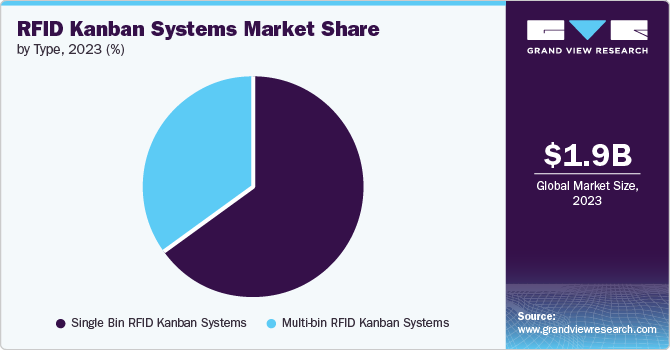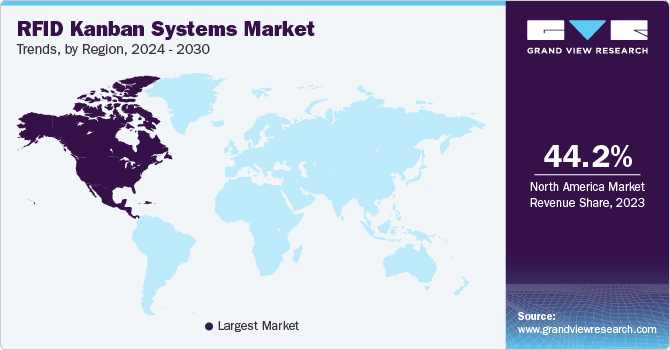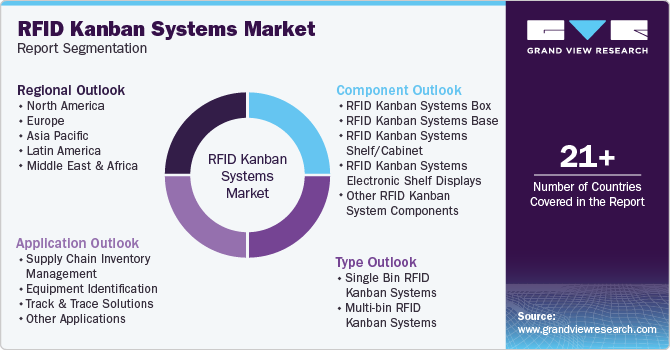
RFID Kanban Systems Market Size, Share & Trends Analysis Report By Type (Single-Bin, Multi-bin), By Component (Systems Box, Systems Base), By Application (Supply Chain), By Region, And Segment Forecasts, 2024 - 2030
- Report ID: 978-1-68038-355-3
- Number of Report Pages: 100
- Format: PDF
- Historical Range: 2018 - 2022
- Forecast Period: 2024 - 2030
- Industry: Healthcare
RFID Kanban Systems Market Size & Trends
The global RFID Kanban systems market size was valued at USD 1.91 billion in 2023 and is projected to grow at a CAGR of 25.9% from 2024 to 2030. The escalating demand for real-time asset and inventory tracking, combined with the increasing adoption of Internet of Things (IoT) and Artificial Intelligence (AI)-based Kanban systems, as well as the growing utilization of Radio-frequency Identification (RFID) technology in supply chain management, are key drivers fueling the growth of the market.

Key factors such as the growing demand for efficient logistics and inventory management in e-commerce. As e-commerce continues to rise, businesses are seeking innovative solutions to streamline their operations and reduce delivery times. RFID Kanban systems have emerged as a preferred choice for achieving this goal, enabling real-time tracking and automation of order processes. This has led to a significant reduction in stock-outs by up to 50%, thereby improving overall supply chain efficiency.
Technological advancements in RFID technology have also contributed to the market’s growth. Continuous innovations have enhanced the effectiveness of RFID systems, enabling batch reading and data processing at an unprecedented scale. This has expanded their applications across various sectors, including healthcare and manufacturing, further driving adoption. The COVID-19 pandemic has also accelerated the demand for contact tracing and efficient inventory management solutions, leading to increased demand for RFID systems.
Cost management is another significant driver of the market, as RFID systems help reduce costs associated with inventory management, such as expired stock and clerical errors. Companies are increasingly recognizing the benefits of implementing RFID Kanban systems, which automate data transfer, provide real-time information, and minimize manual labor. As a result, global companies are shifting towards RFID Kanban systems from traditional Kanban systems to ensure better supply chain stability and effective inventory control. The growing importance of inventory management processes and the need to reduce expired medications have further fueled market growth, driving businesses to adopt RFID Kanban systems for improved efficiency and competitiveness.
Component Insights
RFID Kanban systems box accounted for the largest market share in 2023. Integrating Kanban systems and RFID containers enables seamless connectivity with digital infrastructures and warehouse management systems, enhancing supply chain visibility. Businesses can easily locate and replenish restocking boxes from anywhere, while external suppliers can proactively identify inventory needs, driving demand for RFID Kanban boxes in the market.
RFID Kanban systems box is expected to register the fastest CAGR during the forecast period. As industries such as healthcare, manufacturing, and retail adopt RFID Kanban systems for efficient inventory management and cost reduction, the need for robust infrastructure is increasing. Real-time asset tracking, reduced stock-outs, and minimized errors are key drivers of adoption.
Application Insights
Supply chain inventory management accounted for the largest market share in 2023. Traditional methods rely on manual processes, prone to errors and blind spots. RFID Kanban systems provide real-time inventory visibility through automatic tag reading, eliminating manual counting and enabling constant monitoring across the supply chain. Real-time data enables precise reorder point setting, ensuring just-in-time replenishment and minimizing stock outages and overstocking risks.
Track and trace solutions is projected to grow at the fastest CAGR over the forecast period. Traditional Kanban systems lack real-time inventory tracking, leading to opacity. RFID Kanban with track and trace functionality provides granular visibility into bin and item location and status. This transparency enables proactive monitoring, informed decision-making, and swift identification of bottlenecks or discrepancies. Real-time tracking helps prevent stockouts, reduces shrinkage, and optimizes inventory control.
Type Insights
Single Bin RFID Kanban Systems dominated the market and accounted for a share of 35.98% in 2023 65.1% in 2023. As RFID technology becomes increasingly accessible and easy to implement, single bin RFID Kanban systems have emerged as a cost-effective solution for efficient inventory management. Meeting the demands of e-commerce and just-in-time manufacturing, these systems provide faster and more accurate tracking, enabling businesses to respond quickly to changing market demands and optimize their inventory levels.

The multi-bin RFID Kanban Systems segment is expected to register the fastest CAGR of 26.2% during the forecast period. Multi-bin RFID Kanban systems have revolutionized hospital PAR inventory management by streamlining stock supply tracking and replenishment. With RFID tags and two-bin systems, employees can easily manage supplies, reducing stock shortages, unnecessary supplies, and lost items. As businesses increasingly prioritize end-to-end production oversight, the demand for multi-bin RFID Kanban systems is poised to grow.
Regional Insights
North America RFID Kanban systems market dominated the global RFID Kanban systems market in 2023, generating 44.2% of the worldwide revenue share. Market growth in the region is fueled by economic growth, process improvement demands, and healthcare providers’ interest in RFID technology. As the benefits of successful RFID Kanban systems become more widely recognized, the need for accurate inventory tracking will continue to drive market expansion, with RFID tag demand increasing to support this growth.

U.S. RFID Kanban Systems Market Trends
The RFID Kanban systems market in the U.S. dominated the North America RFID Kanban systems market with a share of 77.7% in 2023. The affordability and ease of implementation of RFID technology make it an attractive solution for businesses of all sizes. The U.S. manufacturing sector, in particular, can greatly benefit from the efficiency and accuracy enhancements offered by single bin RFID Kanban systems, enabling optimized inventory management and reduced costs.
Europe RFID Kanban Systems Market Trends
Europe RFID Kanban systems market identified as a lucrative region in the global RFID Kanban systems market in 2023, driven by the technology’s ability to streamline inventory management. The European Union’s stringent regulations on product traceability and origin, particularly in industries such as food and pharmaceuticals, create a demand for solutions that ensure compliance. Single bin RFID Kanban systems can help European companies meet these requirements by providing detailed tracking data, enhancing supply chain visibility and efficiency.
The RFID Kanban systems market in the UK is expected to grow rapidly in the Europe RFID Kanban systems market. Market growth in the country is aided by companies focusing on developing RFID-equipped Kanban Systems for applications in healthcare, manufacturing, and automotive sectors. The significant market share can be attributed to the presence of numerous companies operating in the region, catering to diverse industry demands.
Asia Pacific RFID Kanban Systems Market Trends
Asia Pacific RFID Kanban systems market anticipated to witness the highest CAGR of 27.8% in the global RFID Kanban systems market over the forecast period. The Asia Pacific region is experiencing rapid industrialization, with countries such as China, India, and Vietnam driving growth in manufacturing. This has created a high demand for efficient inventory management solutions, making RFID Kanban systems a highly attractive option. The region’s vast manufacturing base also presents a significant market opportunity for RFID Kanban system implementation and adoption.
The RFID Kanban systems market in China is projected to grow lucratively in the Asia Pacific RFID Kanban systems market over the coming years, driven by the country’s thriving automotive sector. With China’s car market ranking among the largest globally, the use of RFID tags and Kanban boxes can revolutionize vehicle recognition, prevent theft at dealerships, and streamline car key management. Real-time location and status updates offered by RFID tags make them an ideal solution for the automotive industry, enhancing operational efficiency and reducing losses.
Key RFID Kanban Systems Company Insights
Some key companies in RFID Kanban systems market include BROOKS AUTOMATION; Datelka; Grifols, S.A.; and TwinBin (Hurst Green Plastics Ltd); among others. Leading market players are integrating RFID with Kanban methodologies to boost efficiency and reduce costs. New entrants are emerging, fueled by technological advancements and growing demand for automation. The market is poised for growth, driven by collaborations, partnerships, and customer education.
-
MetraTec GmbH specializes in developing RFID and RTLS technology for IoT applications. Their electronic components enable wireless identification, location tracking, communication, and power transmission, facilitating seamless system integration and data sharing to enhance communication efficiency in various settings.
-
Grifols SA is involved in the development, production, and marketing of plasma-derived medicines and transfusion medicines. The company’s core focus areas include research, development, production, and promotion of innovative plasma-based treatments, hospital pharmacy products, and diagnostic tools for clinical applications.
Key RFID Kanban Systems Companies:
The following are the leading companies in the RFID kanban systems market. These companies collectively hold the largest market share and dictate industry trends.
- BROOKS AUTOMATION
- Datelka
- Grifols, S.A.
- TwinBin (Hurst Green Plastics Ltd)
- LogiTag Systems Ltd.
- MATTTEO
- Metratec GmbH
- Palex
- Pepperl+Fuchs SE
- SCAN MODUL B.V.
Recent Developments
-
In June 2024, Dresselhaus released its RFID Kanban solution, allowing auto manufacturers to automate supply tracking, eliminating manual processes and reducing inventory shortages. The system uses passive UHF RFID tags, antennas, and software to monitor supply levels in real-time.
-
In February 2024, Saint-Gobain acquired CSR, a leading Australian building products company, expanding its presence in the attractive Australian construction market and strengthening its position in Asia-Pacific.
RFID Kanban Systems Market Report Scope
|
Report Attribute |
Details |
|
Market size value in 2024 |
USD 2.39 billion |
|
Revenue forecast in 2030 |
USD 9.53 billion |
|
Growth rate |
CAGR of 25.9% from 2024 to 2030 |
|
Base year for estimation |
2023 |
|
Historical data |
2018 - 2022 |
|
Forecast period |
2024 - 2030 |
|
Quantitative units |
Revenue in USD million/billion and CAGR from 2024 to 2030 |
|
Report coverage |
Revenue forecast, company ranking, competitive landscape, growth factors, and trends |
|
Segments covered |
Component, application, type, region |
|
Regional scope |
North America, Europe, Asia Pacific, Latin America, MEA |
|
Country scope |
U.S., Canada, Mexico, UK, Germany, Germany, France, Italy, Spain, Denmark, Sweden, Norway, China, Japan, India, South Korea, Australia, Thailand, Brazil, Argentina, South Africa, Saudi Arabia, UAE, Kuwait |
|
Key companies profiled |
BROOKS AUTOMATION; Datelka; Grifols, S.A.; TwinBin (Hurst Green Plastics Ltd); LogiTag Systems Ltd.; MATTTEO; Metratec GmbH; Palex; Pepperl+Fuchs SE; SCAN MODUL B.V. |
|
Customization scope |
Free report customization (equivalent up to 8 analysts working days) with purchase. Addition or alteration to country, regional & segment scope. |
|
Pricing and purchase options |
Avail customized purchase options to meet your exact research needs. Explore purchase options |
Global RFID Kanban Systems Market Report Segmentation
This report forecasts revenue growth at global, regional, and country levels and provides an analysis of the latest industry trends in each of the sub-segments from 2018 to 2030. For this study, Grand View Research has segmented the global RFID Kanban systems market report based on type, component, application, and region.

-
Component Outlook (Revenue, USD Million, 2018 - 2030)
-
RFID Kanban Systems Box
-
RFID Kanban Systems Base
-
RFID Kanban Systems Shelf/Cabinet
-
RFID Kanban Systems Electronic Shelf Displays
-
Other RFID Kanban System Components
-
-
Application Outlook (Revenue, USD Million, 2018 - 2030)
-
Supply Chain Inventory Management
-
Equipment Identification
-
Track and Trace Solutions
-
Other Applications
-
-
Type Outlook (Revenue, USD Million, 2018 - 2030)
-
Single Bin RFID Kanban Systems
-
Multi-bin RFID Kanban Systems
-
-
Regional Outlook (Revenue, USD Million, 2018 - 2030)
-
North America
-
U.S.
-
Canada
-
Mexico
-
-
Europe
-
UK
-
Germany
-
France
-
Italy
-
Spain
-
Denmark
-
Sweden
-
Norway
-
-
Asia Pacific
-
China
-
Japan
-
India
-
South Korea
-
Australia
-
Thailand
-
-
Latin America
-
Brazil
-
Argentina
-
-
Middle East and Africa (MEA)
-
South Africa
-
Saudi Arabia
-
UAE
-
Kuwait
-
-
We are committed towards customer satisfaction, and quality service.
"The quality of research they have done for us has been excellent."




